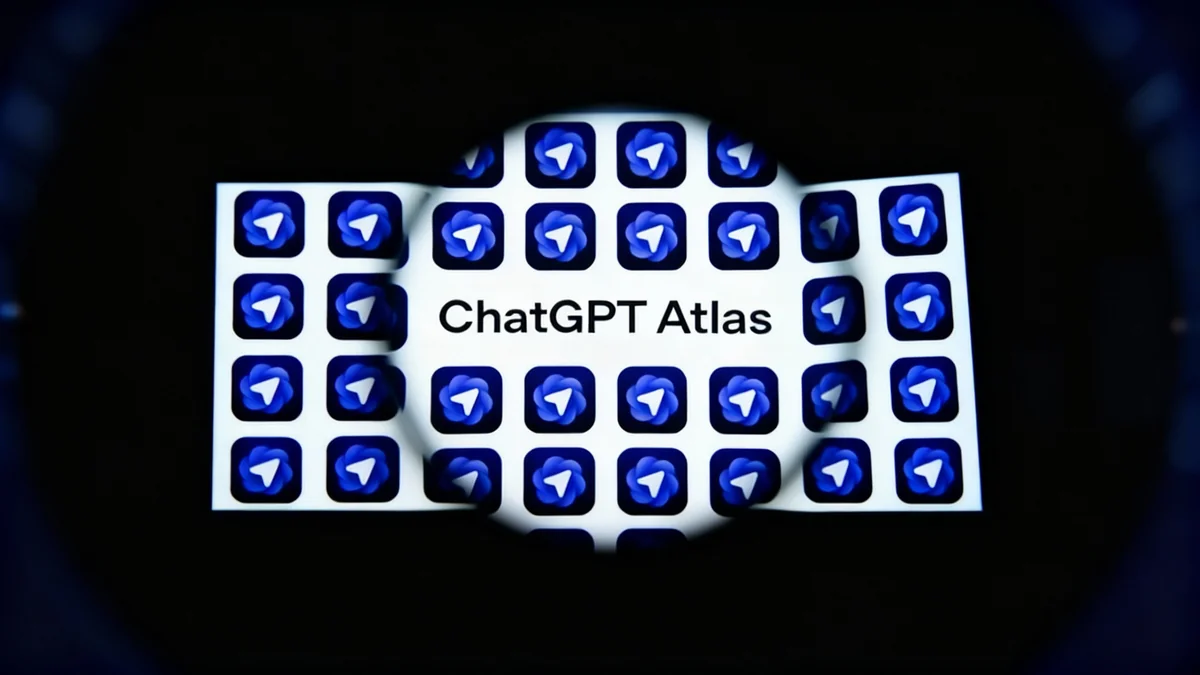OpenAI, the company behind ChatGPT, has introduced a new internet browser named Atlas, designed to integrate artificial intelligence directly into the web browsing experience. The browser aims to offer a more efficient and personalized way to navigate the internet, but its most powerful features will require a paid subscription, a significant departure from the free model that dominates the market.
Key Takeaways
- OpenAI has launched ChatGPT Atlas, a new AI-powered internet browser.
- The browser's core functionality is built around a conversational chatbot assistant.
- Many advanced features, such as automated booking, are restricted to paying subscribers.
- The browser raises questions about user data collection and its role in training future AI models.
- Atlas enters a competitive market dominated by Google Chrome, which holds approximately 60% of the market share.
A New Approach to Web Navigation
The ChatGPT Atlas browser presents a fundamentally different user interface compared to traditional browsers like Google Chrome or Apple's Safari. The most prominent feature is a persistent chatbot sidebar that acts as an intelligent assistant, offering contextual help based on the website being viewed.
For example, when visiting a news website, the AI can suggest trending stories or filter content based on a user's specified interests. On a travel booking site, it might offer to highlight deals or compare prices with other platforms. The goal is to move beyond simple searching and clicking, allowing users to interact with the web through natural language commands.
Early use shows promise for simple tasks. When prompted to find a recently read article without remembering the source website, the browser was able to quickly search the user's history and locate the correct page. This type of task automation is central to OpenAI's vision of creating a "true super-assistant" for the web.
The Rise of AI in Browsers
The integration of AI into web browsers is a growing trend. Microsoft has already incorporated its Copilot AI into the Edge browser, and Google is weaving its Gemini AI into its search engine and Chrome. OpenAI's Atlas is a significant step because it builds the entire experience around the AI, rather than adding it as a feature.
The Subscription Barrier
While the concept is innovative, the full potential of Atlas is locked behind a paywall. During initial tests, many functionalities prompted users to upgrade to a paid ChatGPT plan. Requests to perform complex actions, like booking a train ticket, were met with messages indicating the feature was for subscribers only. Users on the free plan also encountered limits on their interactions with the most advanced AI models.
This business model presents a major challenge in a market where consumers are accustomed to free, high-quality browsers. According to reports from the Financial Times, only about 5% of ChatGPT's existing users currently pay for a subscription. Convincing a larger portion of its 800 million users to pay for a browser will require a dramatic shift in consumer behavior.
"OpenAI may be tempted to show ads to recoup costs and turn a profit, but it also must deliver a good user experience to stand out in a competitive market," said Stephanie Liu, a senior analyst at Forrester.
The company's strategy appears to be betting that the convenience and efficiency offered by a fully integrated AI assistant will be compelling enough for users to open their wallets. This move is also a clear indication of OpenAI's need to generate substantial revenue to justify the billions of dollars in venture capital it has raised.
Data, Privacy, and AI Training
Beyond monetization, the Atlas browser could serve another critical purpose for OpenAI: data collection. AI models improve by processing vast quantities of information. By observing how millions of users interact with websites—how they book tickets, research products, or consume news—Atlas can gather invaluable data to train its systems to better understand and navigate human-oriented processes on the web.
The Scale of AI
Artificial intelligence tools like ChatGPT are built on a principle of scale. The more data they are fed, the more capable and nuanced their responses become. A browser provides a direct pipeline to real-world, real-time human behavior online.
This raises significant privacy considerations. The extent to which OpenAI will use browsing data is not yet fully clear, and for users who prioritize anonymity, this level of monitoring may be a major concern.
"It remains to be seen how OpenAI will use users' data from Atlas, but for users who prefer anonymity and privacy, the browser may be too great of a risk," Ms. Liu noted. Users will have to weigh the benefits of a smarter browser against the potential privacy trade-offs.
Challenging the Dominance of Google
Entering the browser market means directly challenging Google, a company whose Chrome browser is so dominant that it has attracted scrutiny from regulators worldwide. Dislodging an incumbent with such a massive user base is a monumental task.
However, some analysts believe OpenAI's approach could fundamentally disrupt the current model. Erik Goins, founder of app developer Flywheel Studios, suggests that while Google acts as a middleman, ChatGPT aims to eliminate that step entirely.
"You don't search for 'hotels in Miami' and click through Google results anymore," he said. "You just ask ChatGPT and it connects you directly."
This vision of a more direct, conversational internet is compelling. Instead of navigating lists of links, users could simply state their goal and have the AI execute it. Whether this vision is enough to convince hundreds of millions of people to switch browsers—and pay for the privilege—remains the central question. While the "Google killer" narrative has followed ChatGPT since its inception, Atlas marks the company's most direct step yet toward challenging the search giant on its own turf. The road ahead is long, but the competition for the future of the internet is officially underway.





